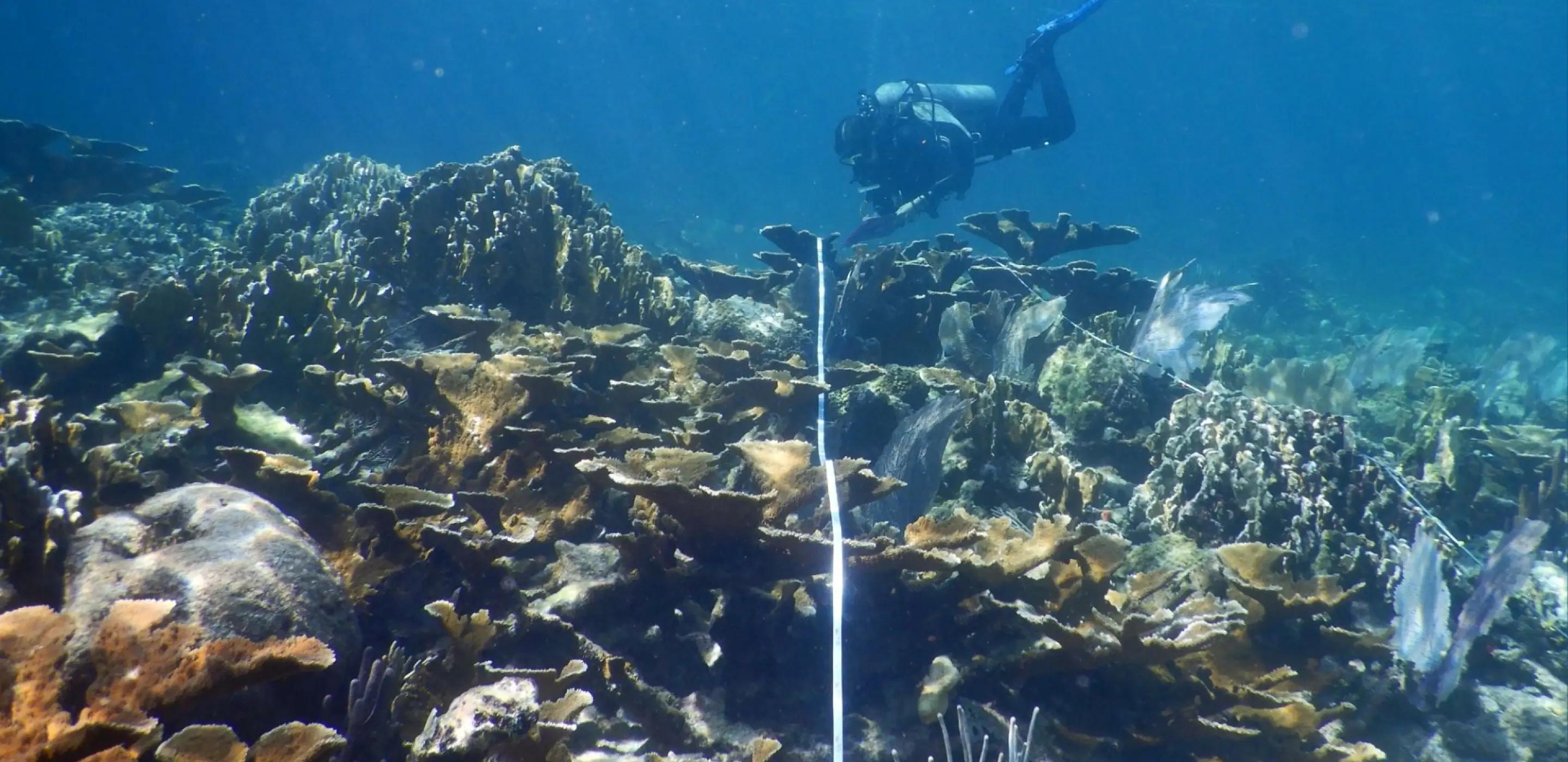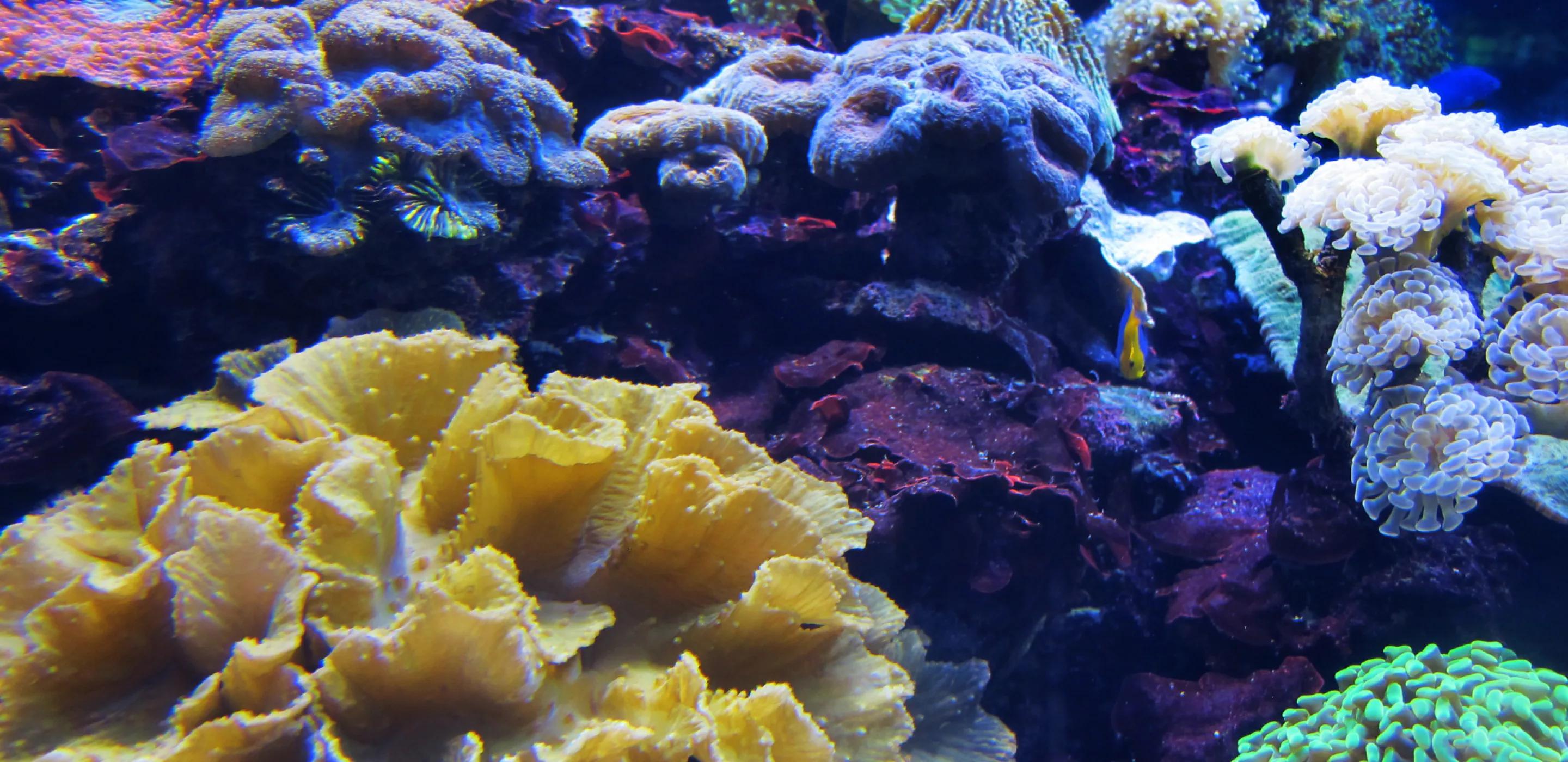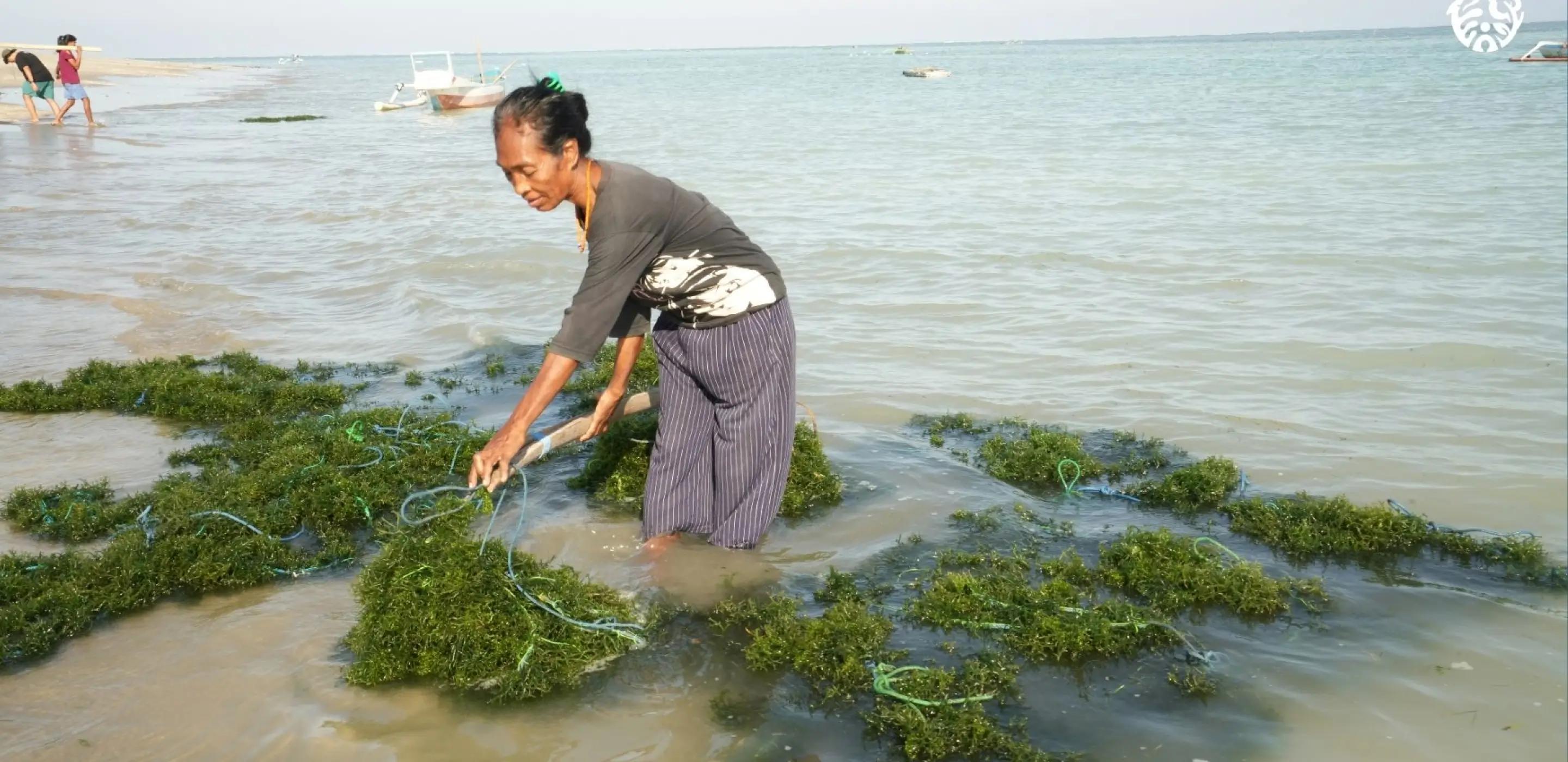Dec 13, 2023
COP28 Outcomes and Highlights
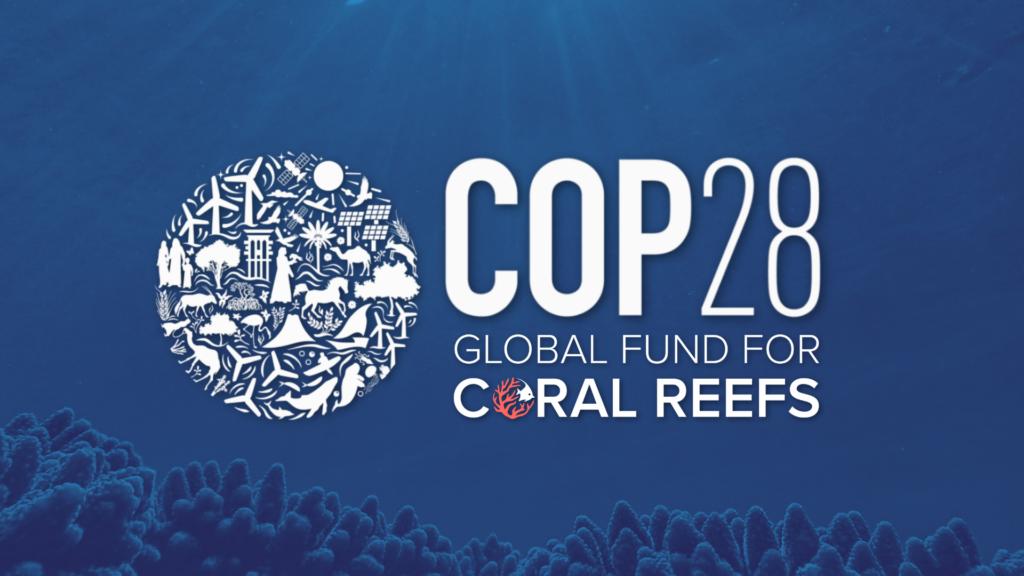
For the first time in nearly three decades of climate change negotiations, through the 28th Conference of the Parties of the UNFCCC (COP28), countries have signalled a “beginning of the end” of the fossil fuel era. The agreement, for the first time in history, explicitly calls on all nations to transition away from fossil fuels. The text, negotiated by nearly 200 Parties, emphasises the urgent need for “deep, rapid and sustained reductions” in emissions to avoid the devastating consequences of exceeding the 1.5°C warming threshold set out by the Paris Agreement.
Although the agreement offers a long overdue step toward addressing the climate crisis, remarkable gaps remain between current international action and the ambitious targets set for achieving net-zero emissions by 2050 and preserving the 1.5° goal. As UN Climate Change Executive Secretary Simon Stiell stated in his closing speech, “Whilst we didn’t turn the page on the fossil fuel era in Dubai, this outcome is the beginning of the end,” adding “Now all governments and businesses need to turn these pledges into real-economy outcomes, without delay.” In addition to drastically reduced emissions, a robust and swift scale up of climate finance is required to address adaptation needs of climate-vulnerable states, as well as loss and damage incurred from increasing impacts.
Additionally, as recognised by the world’s first ‘Global Stocktake’ and throughout COP events, climate finance must work to protect, conserve, and restore natural ecosystems. The newly published Stocktake specifically encourages the implementation of integrated, multi-sectoral “nature-based solutions and ecosystem-based approaches, and protecting, conserving and restoring nature and ecosystems, including forests, mountains and other terrestrial and marine and coastal ecosystems”, underscoring their social and environmental benefits such as improved resilience and well-being and potential to “contribute to mitigating impacts and losses.” Moreover, the text stresses the need for upscaled nature-based adaptation efforts.
As a key piece of the nature agenda at this year’s Climate Conference, recognising the imperative to improve ocean health and preserve its role as a climate ally, the ocean held a visible position during the conference and within the final Global Stocktake text. Key events placed emphasis on the role of the ocean and its ecosystems in helping to achieve the Paris Agreement goals, as well as in resilience-building efforts, culminating in strong calls for increased public-private collaboration and financial commitments for conservation. Country and thematic event spaces, notably including the Ocean and UN Environment Pavilions, enabled key convenings among diverse stakeholders to advance knowledge sharing and present financial needs facing science-based implementation.
As part of emphasis on the need to limit anthropogenic warming to 1.5 °C to help preserve ecosystem function, as well as the key role marine ecosystems hold in support of resilience and adaptation needs, coral reefs were featured throughout the COP. This was further exemplified with the launch of the 2030 Coral Reef Breakthrough, in partnership with the High-Level Climate Champions (HLCC) and the International Coral Reef Initiative (ICRI). For the first time, the Coral Reef Breakthrough, sets global targets to guide efforts and underline needs in the fight to prevent the first functional extinction of an entire ecosystem in our lifetime. The Breakthrough text holds two key targets:
- Target One: Secure the future of at least 125,000 km2 of shallow-water tropical coral reefs; and
- Target Two: Achieve investments of US$12 billion by 2030.
Recognising the need for “tackling greenhouse gas emissions in parallel to addressing local drivers of coral reef decline with concrete actions”, the Breakthrough text further calls for the doubling of the area of coral reefs under effective protection and acceleration of restoration efforts.
Amid the heightened focus, COP28 proved to be a valuable platform for strategic engagement opportunities for GFCR Coalition members to accelerate collaboration and greater action for coral ecosystems. At the COP, the GFCR’s blended finance approach was showcased through 15 events, including by global coalition representatives and implementing partners, including representatives of programmes in Seychelles, Indonesia, Kenya and Tanzania, and the Philippines. In an effort to foster collaborations with key stakeholders in ocean-finance and conservation, GFCR global representatives engaged in numerous bilateral and multilateral meetings with donors, key experts, technical partners and potential investors. Further, the GFCR Coalition showcased new announcements including expansion of its programme portfolio to include five additional coral nations: Sri Lanka, Jordan, Micronesia, Marshall Islands, and Palau.
The GFCR also secured new financial pledges as well as endorsements for the Coral Reef Breakthrough, underscoring greater commitment to deliver on the newly set global targets. In a noteworthy announcement, H.E. Hervé Berville, France’s State Secretary for the Sea, stated: “We are happy to announce today that we will increase our financial commitment to the Global Fund for Coral Reefs of €1 million, for this year, and we will continue increasing our investment, our commitment, because it is, for us, a key element for our ocean diplomacy.”
In conjunction with France’s resolute commitment, formal endorsements of the Coral Reef Breakthrough were received from numerous states, including from the Governments of Canada represented by the Honourable Steven Guilbeault, Minister of Environment and Climate Change; the United Kingdom, represented by the Rt Hon Andrew Mitchell MP, Minister of State in the Foreign, Commonwealth & Development Office; and Brazil, represented by Ana Paula Prates, Director of the Department of Oceans and Coastal Management. This collective support serves to fortify global dedication to great action to safeguard a future for coral reefs.
The initiatives undertaken by the GFCR at COP28 amplify the urgent need for greater climate action and aim to serve as a catalyst for acceleration of climate-smart strategies to preserve marine ecosystems. This strategic groundwork is a key milestone on the road to the 2025 UN Ocean Conference — set to offer a historical turning point for ocean conservation efforts.
Photographs of GFCR’s COP28 engagements and events may be found here and further event highlights, as well as links to session recordings are detailed below:
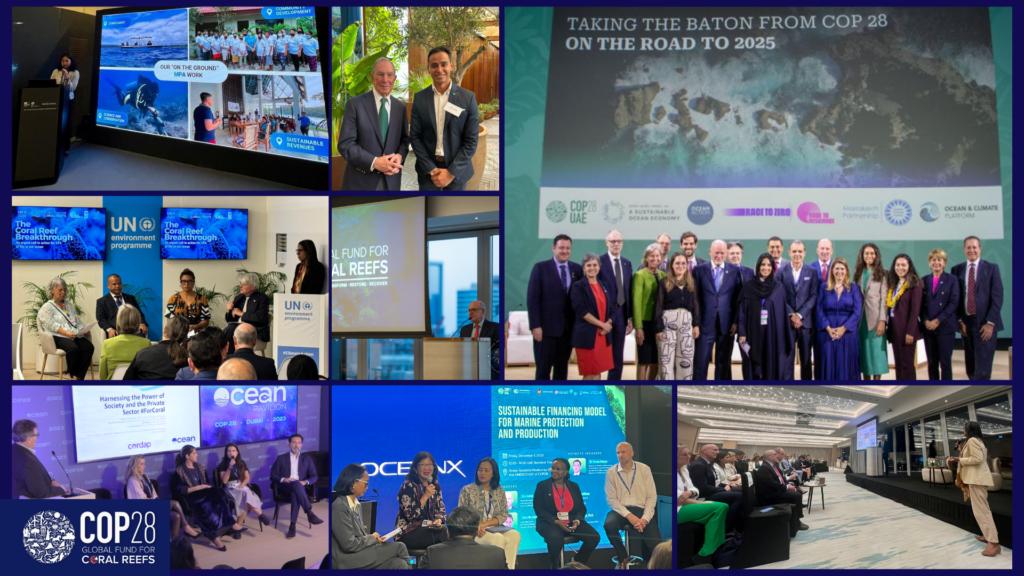
Powering Ocean Breakthroughs with 100% Sustainable Ocean Management
Event RecordingOrganised by the COP28 Presidency, HLCC, High Level Panel for Sustainable Economy and the Ocean & Climate Platform, the event spotlighted the ocean and underscored country commitments toward the goal of achieving 100% Sustainable Ocean Management through the development and implementation of Sustainable Ocean Plans (SOPs)—integral to addressing Ocean Breakthroughs. Speakers showcased ocean-based climate solutions to reduce the emissions gap between current and future emissions by up to 35 percent on a 1.5°C pathway. In this high-level event, Susan Gardner, Director of the Ecosystems Division at UNEP, announced the financial commitments from the GFCR, as part of the launch of the Coral Reef Breakthrough, and the essential role of nature-based solutions in addressing climate challenges, with coral reefs serving as a prime example of a blue nature-based solution.
Sustainable Financing Model for Marine Protection and Production
Jointly organised by the Ministry of Marine Affairs and Fisheries RI, Ministry of Environment and Forestry RI, Conservation International, Konservasi Indonesia, GFCR, The Nature Conservancy, and Yayasan Konservasi Alam Nusantara, the session explored opportunities for harmonising marine-coastal protection with sustainable economic activities, fostering cooperation, facilitating knowledge exchange, and paving the way for potential global replication. Among the noteworthy outcomes was the announcement of the GFCR-supported Indonesia programme, reflecting Indonesia’s steadfast commitment to adopting a sustainable financing model. The event featured Dale Galvin, Managing Director of the GFCR as well as the Programme Lead from the GFCR Indonesia programme and Executive Chair of Konservasi Indonesia, Meizani Irmadhiany. More coverage on this event can be found here from the Ministry of Maritime and Investment in Indonesia.
COP28 Coral Reef Breakthrough Launch Event
Event RecordingThe High-Level launch event of the 2030 Coral Reef Breakthrough marked a watershed moment in global action to save the world’s most threatened ecosystem. This event, led by the GFCR and in partnership with HLCC, Race to Resilience, ICRI, UNEP, the United Nations Development Programme (UNDP), and the United Nations Capital Development Fund (UNCDF), launched the global targets for coral reef action through the Coral Reef Breakthrough, along with the announcement of new actions and financial commitments from both public and private leaders. The session featured the championship of the Breakthrough by coral nations and ocean-action leaders, as well as presentation of its pivotal role in expanding the scale of actions and funding. During the event, representatives of the GFCR Coalition announced the mobilisation of more than $200 million USD as an initial direct investment toward the newly established Coral Reef Breakthrough targets to scale conservation solutions. In addition to mobilising greater co-financing from global actors, the GFCR Coalition announced an ambition to directly raise and invest an additional $500 million USD towards Coral Reef Breakthrough actions by 2030, leveraging public and private investments with the potential to amplify conservation returns up to $2.5 billion USD. Checkout the feature of the high-level launch in the Earth Journalism Network.
Climate-Forward Ocean Conservation Strategies to Deliver on Global Targets
Event RecordingHosted by Bloomberg Philanthropies, GFCR, TNC, the United Nations Environment Programme (UNEP), Race to Resilience, Ocean & Climate Platform, and the Global Mangrove Alliance (GMA), the event showcased the importance of the Mangrove and Coral Reef Breakthroughs within the broader context of international targets. Panellists showcased progress and initiatives achieved over the past year, welcoming the growing momentum in scaling community support and securing financing for the ocean. H.E. Ambassador Peter Thomson, UN Secretary-General’s Special Envoy for the Ocean, in his address, called for a pivot in investment toward science, sustainable blue economy, and a nature-friendly circular economy. These efforts, supported by the Kunming-Montreal Global Biodiversity Framework (GBF), underscored the urgency of initiatives within the broader framework of international sustainability objectives.
Building the New, Blue Economy: Investing for Sustainable Oceans & Climate
Hosted by the Prince Albert II of Monaco Foundation (PA2MF), this high-level convening on the sidelines of COP28 amplified private investments in ocean-positive solutions to bridge the coral reef funding gap. The session, attended by GFCR representatives, offered state officials and private sector leaders the opportunity to learn and interact with tangible ocean-positive investments and the supporting high-impact financing vehicles for the sustainable blue economy. Topics covered included GFCR’s blended finance approach as a model to achieve triple-bottom-line returns, investment strategies at the ocean-climate nexus, climate adaptation and mitigation impact generation, as well as case studies of investment deals already underway. Attendees also heard about GFCR’s position as a private investment vehicle for the Coral Reef Breakthrough.
COP28 Virtual Ocean Pavilion: Advancing the Coral Reef & Mangrove Breakthroughs
Event RecordingHosted by GFCR, GMA, ICRI, UNEP, UNDP, and HLCC, this virtual event will center around the Ocean Breakthroughs which are integral to the Sharm el Sheikh Adaptation Agenda and the Global Biodiversity Framework. The session presented the Coral Reef Breakthrough and the Mangrove Breakthrough agendas and targets to the public audience including policymakers, experts, practitioners and leaders from the public, private, and academic sectors. In this event, renowned scientists, practitioners, and experts presented the agendas of these Breakthroughs and highlighted key issues related to coral reef and mangrove conservation and restoration. The discussion addressed how these global targets can help prevent the extinction of these threatened ecosystems and the collective effort urgently required to meet these goals.
From Pledges to Action for Coral
Event RecordingHosted by the G20 CORDAP, this event underscored the link between the GBF with coral restoration efforts and the role of healthy coral reefs in achieving sustainable seas and 30% of marine ecosystems recovering or under protection. Nicole Trudeau, GFCR Strategic Engagement & Partnerships Specialist highlighted the significance of GFCR and blended finance as a vehicle to mobilise private-public funding toward the coral agenda. Additionally, Marie May Jeremie, CEO of SeyCCAT, showcased the existing efforts in Seychelles and discussed the GFCR-supported Seychelles programme, providing valuable insights into practical applications and the impact of coral restoration initiatives. The event also spotlighted the Coral Reef Breakthrough, the strategic roadmap to attain its targets, and the importance of fostering synergies among stakeholders to deliver on its objectives.
Ocean Climate Solutions Dialogues
Hosted by OceanX and the United Nations Educational, Scientific and Cultural Organization’s (UNESCO) Intergovernmental Oceanographic Commission (IOC), the Ocean Climate Solutions Dialogues highlighted the crucial role of science, media, technology, and education in advancing ocean-based solutions for climate action and sustainable development. During this session, Grace Catapang, GFCR Frontline Youth Representative and Communication and Science Coordinator for BA Philippines, delivered a 10-minute presentation on the innovative approach of the GFCR-supported Philippines programme. Specifically, Grace shed light on the reef-positive businesses under the programme and how they aim to establish an innovative blended finance facility to support MPAs.
Solutions Toolbox to Save Coral Reefs
Event RecordingOrganised by the Woods Hole Oceanographic Institution and co-hosted by the GFCR, International Coral Reef Society (ICRS), Coral Research and Development Accelerator Platform (CORDAP), Coral Restoration Consortium (CRC), and ICRI, the event showcased and deliberated tools from the realms of science, finance, politics, and community engagement that were being developed to safeguard coral reefs. Meizani Irmadhiany, Programme Lead from the GFCR Indonesia programme and Executive Chair of Konservasi Indonesia, highlighted the GFCR-funded Indonesia programme and its impact on coral reef resilience, sustainable livelihoods, and investment mobilisation for reef-positive businesses, as well as the role of blended finance as a key tool in moving forward to increase the resilience of the reefs, both for production and protection.
Partnerships to Improve Blue Carbon Market Integrity
Event RecordingLed by GRID-Arendal, the event illuminated the evolving landscape of the blue carbon market. Focused on the intersection of climate action, social justice, and environmental sustainability, the session featured Grace Catapang, GFCR Frontline Youth Representative and Communication and Science Coordinator at BA Philippines, who discussed the perspective of coastal communities and the need for integrity in blue carbon market projects. The event underscored the crucial importance of a community-centric approach in blue carbon efforts, as well as aligning blue carbon initiatives with existing government policies for their success and integration into broader climate action strategies.
Better Blending: Tipping Points to Unlock Capital
Grace Catapang, GFCR Frontline Youth Representative and Communication and Science Coordinator at BA Philippines, participated in this engagement hosted by UBS Optimus Foundation and the Blended Finance Taskforce. This gathering brought together senior leaders to deliberate on strategies for unlocking capital essential for achieving sustainable development and climate goals. Grace delivered a case study on the GFCR Philippines programme, led by Blue finance. A key insight shared during the presentation was the transformative potential of the programme’s approach for Marine Protected Areas (MPAs), establishing a precedent for impact investment in marine conservation and economic development.
Harnessing the Power of Society and the Private Sector #ForCoral
Event RecordingHosted by CORDAP, the event highlighted the necessity for a judicious and comprehensive approach for coral action, emphasising collaboration among the private sector, key stakeholders, research institutions, and society. Delving into aspects of international collaboration, funding mechanisms, and donor support, the event delineated a strategic trajectory toward a future where coral ecosystems can thrive. During the session, GFCR representative and ESG & Impact Manager of Pegasus Capital Advisors, Natalie Gartmann, discussed GFCR’s investment in CarbonWave and its groundbreaking “cascading biorefinery” model for upcycling the over-supply of Sargassum seaweed into high-value biomaterials while simultaneously supporting ocean health and sequestering greenhouse gases.
Opening of the Blue Ecosystems Pavilion and Waterside Chat
Event RecordingLed by UNEP, the event was facilitated by Leticia Carvalho, Head of UNEP Marine & Freshwater Branch and GFCR Executive Board Co-Chair, and featured speakers such as UNEP Goodwill Ambassadors Dia Mirza and Rocky Dawuni, alongside Grace Catapang, GFCR Frontline Youth Representative and Communication and Science Coordinator at Blue Alliance (BA) Philippines, and Susan Gardner, UNEP Ecosystems Director. During the session, the speakers underscored the vital importance of the health of blue ecosystems, as well as the need to address challenges and advocate for solutions to ensure their sustainability. Personal stories and thoughtful discussions on the speakers’ connection with blue ecosystems were shared, accompanied by calls to action for COP28 and beyond.
Coral Conservation in the Red Sea
Organised by Coral Vita, the session brought together reef scientists and management experts to discuss the shared management of these ecosystems across international borders. The focus of this gathering was to ignite collaboration and action to preserve and protect the fragile coral ecosystems in the Egyptian Red Sea, which are currently under threat from an array of human and natural stressors. During this session, GFCR representatives shed light on GFCR’s regional approach, including efforts underway for blended finance programming in Egypt and Jordan.
Unheard Voices: Emerging Leadership in Coral Conservation and Restoration from the Global South
Event RecordingHosted by G20 CORDAP, this event amplified the often-overlooked voices of the Global South. In this gathering, leaders, coral experts, and youth advocates convened to acknowledge the invaluable contributions of the Global South to coral restoration and conservation, addressing the struggles they face in safeguarding corals and coral reefs. During the session, Grace Catapang, GFCR Frontline Youth Representative and BA Philippines’ Communication and Science Coordinator, emphasised the challenge of insufficient resources and funding hindering the effective implementation of MPAs in the Global South, as well as the approach of the GFCR-supported Philippines programme in adopting a proactive stance in addressing resource and funding gaps.
Share on:
Get the latest insights from the GFCR delivered to your inbox.
Sign up to the GFCR newsletter
